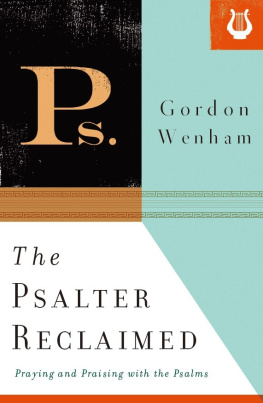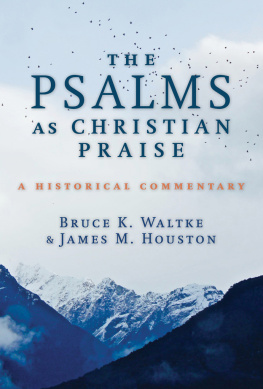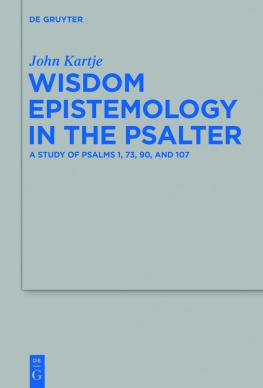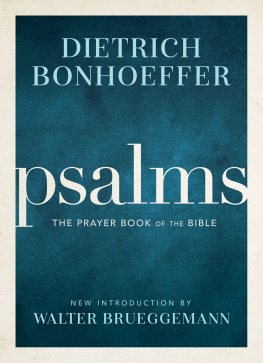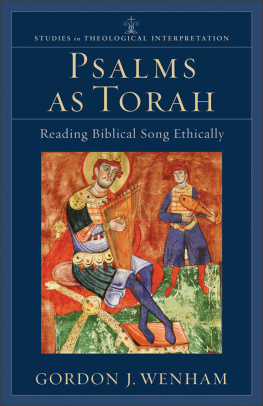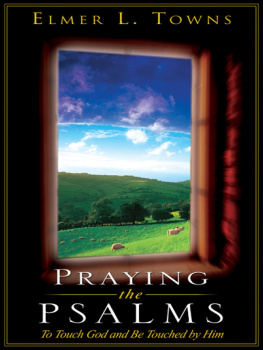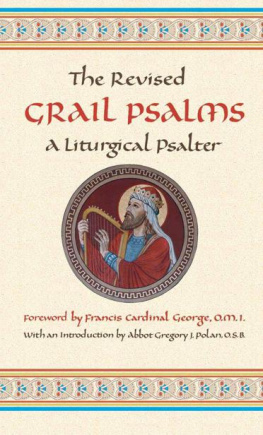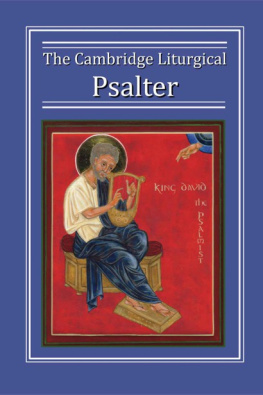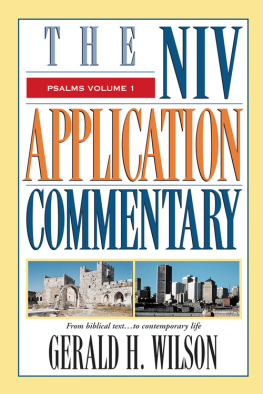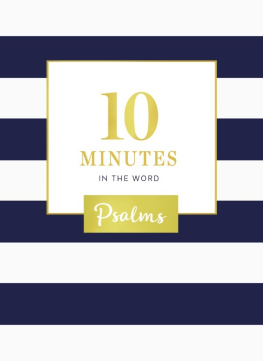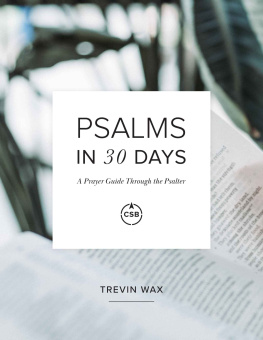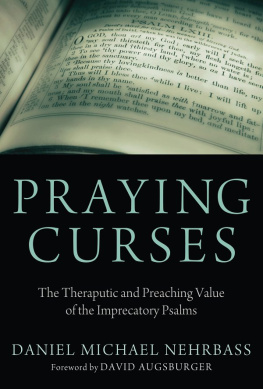Gordon Wenham - The Psalter Reclaimed: Praying and Praising with the Psalms
Here you can read online Gordon Wenham - The Psalter Reclaimed: Praying and Praising with the Psalms full text of the book (entire story) in english for free. Download pdf and epub, get meaning, cover and reviews about this ebook. year: 2013, publisher: Crossway, genre: Religion. Description of the work, (preface) as well as reviews are available. Best literature library LitArk.com created for fans of good reading and offers a wide selection of genres:
Romance novel
Science fiction
Adventure
Detective
Science
History
Home and family
Prose
Art
Politics
Computer
Non-fiction
Religion
Business
Children
Humor
Choose a favorite category and find really read worthwhile books. Enjoy immersion in the world of imagination, feel the emotions of the characters or learn something new for yourself, make an fascinating discovery.
- Book:The Psalter Reclaimed: Praying and Praising with the Psalms
- Author:
- Publisher:Crossway
- Genre:
- Year:2013
- Rating:4 / 5
- Favourites:Add to favourites
- Your mark:
- 80
- 1
- 2
- 3
- 4
- 5
The Psalter Reclaimed: Praying and Praising with the Psalms: summary, description and annotation
We offer to read an annotation, description, summary or preface (depends on what the author of the book "The Psalter Reclaimed: Praying and Praising with the Psalms" wrote himself). If you haven't found the necessary information about the book — write in the comments, we will try to find it.
One of the most respected Old Testament scholars of our time introduces us to the history of scholarship on the Psalter and provides hermeneutical guidelines for interpreting the book making accessible to us the transforming messages of the Psalms.
Gordon Wenham: author's other books
Who wrote The Psalter Reclaimed: Praying and Praising with the Psalms? Find out the surname, the name of the author of the book and a list of all author's works by series.
The Psalter Reclaimed: Praying and Praising with the Psalms — read online for free the complete book (whole text) full work
Below is the text of the book, divided by pages. System saving the place of the last page read, allows you to conveniently read the book "The Psalter Reclaimed: Praying and Praising with the Psalms" online for free, without having to search again every time where you left off. Put a bookmark, and you can go to the page where you finished reading at any time.
Font size:
Interval:
Bookmark:
Thank you for downloading this Crossway book.
Sign-up for the Crossway Newsletter for updates on special offers, new resources, and exciting global ministry initiatives:
Crossway Newsletter
Or, if you prefer, we would love to connect with you online:
Google +
C HAPTER 1
Let me write the songs of a nation, and I care not who writes its laws. So said the distinguished Scottish politician Andrew Fletcher in a book published in 1704. Fletcher was a forerunner of the Scottish National Party in fighting for Scottish independence. His comment is the more intriguing in that as a member of the Scottish parliament he was very active in promoting legislation. Yet he recognized the power of song to capture and mold peoples imaginations and attitudes to life.
This insight, though, seems to have eluded most biblical scholars. The significance of the Psalms for biblical ethics has been surprisingly overlooked. Their unique character as powerful shapers of individual virtues and social attitudes is largely ignored in books on Old Testament ethics. It is my belief that reciting the psalms, and specially singing them, has profoundly influenced both Jewish and Christian theology and ethics.
Most, if not all, of the psalms were originally composed to be sung in temple worship, and through the centuries they have continued to be sung in church and synagogue. So in this chapter I first want to give a brief overview of the history of their liturgical use and discuss the peculiar impact of setting their words to music. But the Psalters present arrangement suggests that when the psalms were collected together as a book, it may well be that a secondary use for them developed, namely, as a resource for private meditation and devotion. I want to suggest that the Psalter is a deliberately organized anthology designed for memorization. In the days before the printing press Scripture was regularly memorized, and certain features of the Psalter suggest that it was used this way. I shall reflect on the implications that memorization has for their authority.
Finally I want to use speech-act theory to explore what we are doing when we recite publicly or sing the psalms. I will suggest that in some ways singing a psalm or hymn is like taking an oath: we are committing ourselves in a binding way to a particular set of beliefs and embracing a lifestyle. Perhaps this is not evident on the surface, but I hope to show that there is much more to singing the psalms than exercising our lungs!
Singing the Psalms down the Ages
The books of Chronicles contain many references to psalm singing, both in the temple and outside it. They tell how David appointed the Levites to lead worship. Some of the Levites carried the ark to Jerusalem while others sang and played musical instruments (1 Chron. 15:1516). When the Israelites arrived in Jerusalem, Chronicles records that David appointed the Levites to sing thanksgivings. First Chronicles 16:836 gives the texts sung on this occasion. These correspond to Psalm 105:115 (1 Chron. 16:822); Psalm 96:113 (1 Chron. 16:2334); and Psalm 106:4748 (1 Chron. 16:3536). Presumably these are to be understood as just a selection of the psalms used on this great occasion. It is not clear what others could have been used.
The use of psalms in temple worship is confirmed by a study of the psalms themselves. Conventional form criticism has ignored the titles of psalms and developed its theories on the basis of the content of the psalms alone. The numerous references to entering the temple and offering sacrifice, and the obvious relevance of many psalms to the great national festivals, such as Passover and Tabernacles, led scholars such as Gunkel and Mowinckel to argue that many of the psalms were composed for use in the pre-exilic temple.
The titles of the psalms point in the same direction. One says it is for the thank offering (Psalm 100, RSV ), another for the Sabbath (92). Many others have the heading To the choirmaster, if that is the right translation, while sometimes the tune seems to be specified according to Lilies (45, 69, 80) or according to the Dove on Far-off Terebinths (56). The book of Nehemiah tells of two choirs processing around the just-rebuilt walls of Jerusalem singing psalms (Neh. 12:3143).
Among the Dead Sea Scrolls, manuscripts of the Psalms are more frequent than any other type, attesting their widespread use among Jews in New Testament times. The Gospels describe Jesuss triumphal entry into Jerusalem and the crowds greeting him with Psalm 118, Hosanna! Blessed is he who comes in the name of the Lord! (Mark 11:9; cf. Ps. 118:2526). Jesus himself and his disciples sang this psalm and the immediately preceding ones at the Last Supper. The early church continued the practice of singing the psalms. Paul assumed that the Corinthians, Colossians, and Ephesians sang the psalms: Let the word of Christ dwell in you richly, teaching and admonishing one another in all wisdom, singing psalms and hymns and spiritual songs, with thankfulness in your hearts to God (Col. 3:16; cf. 1 Cor. 14:26; Eph. 5:19).
By the beginning of the fourth century the memorization of the Psalms by many Christians and their habitual use as songs in worship by all Christians about whom we know were matters of long-standing tradition. The use of the Psalms in private prayer and public worship is most eloquently advocated by Athanasius in his letter to Marcellinus. He wrote:
Whatever your particular need or trouble, from this same book you can select a form of words to fit it, so that you not merely hear and then pass on, but learn the way to remedy your ill.
If you want to declare anyone to be blessed; you find the way to do it in Psalm 1, and likewise in 32, 41, 112, 119, and 128. If you want to rebuke the conspiracy of the Jews against the Saviour, you have Psalm 2. If you are persecuted by your own family and opposed by many, say Psalm 3; and when you would give thanks to God at your afflictions end, sing 4 and 75 and 116. When you see the wicked wanting to ensnare you and you wish your prayer to reach Gods ears, then wake up early and sing 5.
Athanasius sees Psalm 32 as particularly appropriate at baptisms: Whenever a number of you want to sing together, being all good and upright men, then use the 33rd [Shout for joy in the L ORD , O you righteous! / Praise befits the upright].
When St. Benedict established monasteries in the sixth century, he prescribed that psalms should be used at the eight services of the day. Some psalms (e.g., 51, 134) were used every day, and in the course of the whole week all the psalms would be sung. But it was not just in the monasteries that the psalms were used. In the Middle Ages the Psalter was the only part of the Bible a layman was likely to own. It is said that King Alfred the Great was frequent in psalm-singing and prayer at the hours both of the day and night. Martin Luther, as a good monk, was brought up on the Psalms, and Luther scholars think that it was his study of the Psalms that led him to his understanding of justification by faith.
Certainly Luther encouraged the singing of the psalms in public worship. He said, The whole Psalter, Psalm by Psalm, should remain in use, and the entire Scripture, lesson by lesson, should continue to be read to the people. His first hymnbook contained twenty-three hymns, of which six were versions of psalms. The Reformed tradition was even more diligent in producing singable metrical versions of the psalms. Bucer, Calvin, Hopkins, and Tate and Brady produced collections of metrical psalms. These continue in use in many Presbyterian churches even today. In other churches the situation is mixed. Since Vatican II, Roman Catholics have been singing more of the psalms, but I fear that in many Protestant churches the psalms have been displaced by hymns and songs. Indeed in a seminary at which I was examiner I was shocked to find there was no study of the Psalms in their BD (MDiv) program!
Next pageFont size:
Interval:
Bookmark:
Similar books «The Psalter Reclaimed: Praying and Praising with the Psalms»
Look at similar books to The Psalter Reclaimed: Praying and Praising with the Psalms. We have selected literature similar in name and meaning in the hope of providing readers with more options to find new, interesting, not yet read works.
Discussion, reviews of the book The Psalter Reclaimed: Praying and Praising with the Psalms and just readers' own opinions. Leave your comments, write what you think about the work, its meaning or the main characters. Specify what exactly you liked and what you didn't like, and why you think so.

